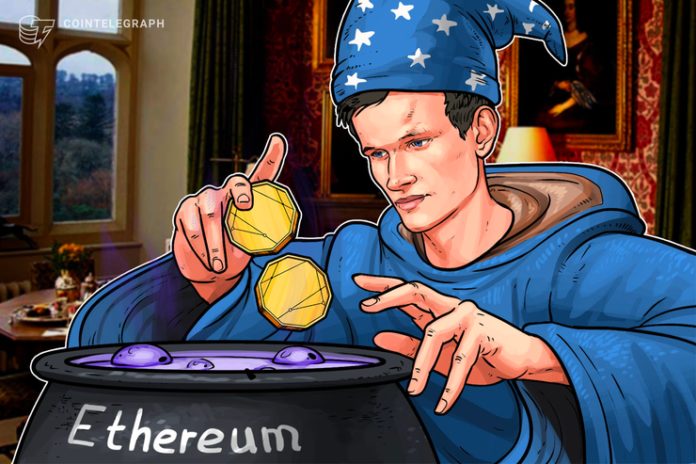[ad_1]
Vitalik Buterin has claimed that Ethereum will support 3,000 transactions per second after the upcoming Istanbul fork.
Will this unleash a new wave of Ethereum creativity? Might we expect a surge in traffic on the Ethereum network? Could its increase influence the price of ETH?
Ethereum is slow
The conventional wisdom is that Ethereum is too slow. But for what purpose is it too slow? It seems to be sufficiently fast for financial services. But the mistake people are making in saying “Ethereum is slow” is misunderstanding what a great thing, counterintuitively, it is to be slow. ETH works because users want to pay (in the form of “gas”) to perform computations.
If Ethereum is congested, it means that there are more people who want to pay to have Ethereum computations than there are the capacity to allow it.
To put it in another way, let’s say that you own an Apple Store and there is an ever-growing line of customers waiting to buy the newest iPhone. The more customers you have, the more the profit. If you are having trouble accepting the amount of money people want to give you in order to use your service, you are doing well. You wouldn’t complain in that situation.
The “world computer” isn’t a thing
So, it turns out that achieving consensus over computation is very expensive — and therefore, as slow as molasses. Istanbul will make Ethereum’s consensus a bit faster, but the term “world computer” seems hyperbolic, as it suggests there could be a singular device that handles the world’s computational needs. It doesn’t even get close at 3,000 transactions per second. Ethereum’s current state is more akin to a “Trust Machine” — to borrow the name of Alex Winter’s blockchain documentary — than a “world computer.”
DApps are also not a thing
What is a “decentralized application”? It’s a mixed metaphor that is prone to confusion. The word “app” is inseparable from the rise of smartphones and naturally the rise of the “App Store.” So, as soon as you say “DApp,” you are depicting a similar world of endless possibility and creativity. This flawed reasoning is compounded by talk in the original Ethereum white paper about the creation of a Turing complete “World Computer.” This suggests that there are an infinite number of applications that are able to run on Ethereum. But since running computations under consensus comes with a cost, it will always be greater than the cost of running computations without consensus — even if the cost of consensus is greatly reduced.
Vending machines are a thing
The cost of consensus is why it makes more sense to talk about what Nick Szabo calls “Vending Machines.” If a line of code is not handling value, then why not execute it in a faster, cheaper, more centralized environment? This reduces the practical applications of storing, transmitting, buying, selling, splitting, sharing or otherwise manipulating value. This means practical applications would naturally be pragmatic value-in, value-out smart contracts like decentralized exchanges, token swaps, nonfungible token vending, token-issuance (ICO or STO) contracts, and lending and arbitrary financial products (DeFi). If we had a “World Computer” (we don’t), it might make sense to talk about DApps, but until then, what we have are vending machines.
Lending machines are also a thing
Smart contracts relating to collateralizing and lending digital assets are getting a lot of attention these days. Concerning this, ETH in particular is well positioned, as it has a relatively large liquidity pool and a very high degree of programmability. DeFi means that there are vastly diverse sets of programmable digital financial products, but at the moment, the idea of a “Lending Machine” is one that is getting the most attention. In particular, lending seems attractive because current DeFi protocols are producing up to 10% interest rates. This could be seen as a “killer app” for crypto because traditional banks have been so close to 0% interest for so long — and it’s a compelling reason for new users to come to crypto. Currently, almost $700 million in value is locked in DeFi contracts. It remains to be seen whether such high rates will hold up as more and more money floods into the market seeking high returns.
Slot machines
Another obvious application is gambling apps. This is a variation on the “decentralized exchange,” but instead of exchanging a predictable amount of one token for another, users essentially exchange tokens for unpredictable returns. One of the advantages of smart contract-based gambling over other forms of online gambling is that scrutinizing the smart contracts can enable players to determine if the gambling machine is “provably fair,” unlike the centralized exchanges that are only demonstrably unfair.
The need for speed
If all we are building are vending machines, lending machines and slot machines, do we really need performance? Purveyors of “decentralized exchanges” insist that once they are fast enough, they will achieve the liquidity of “centralized exchanges.” But historically, liquidity has always moved toward high frequency trading venues — and trusted computing will always confer a performance edge versus trustless.
One of the great things about the increase in performance is simply to increase the capacity of existing apps, and to enable more similar apps to run on Ethereum. But the performance increase from Ethereum Istanbul seems unlikely to produce as-yet-unseen types of applications.
Miko Matsumura is a general partner with venture capital fund gumi Cryptos Capital. He is also a co-founder of Evercoin, a wallet and exchange. He has been working in Silicon Valley for 25 years on open-source software projects, starting with the introduction of the Java programming language, for which he was the chief evangelist.
[ad_2]










